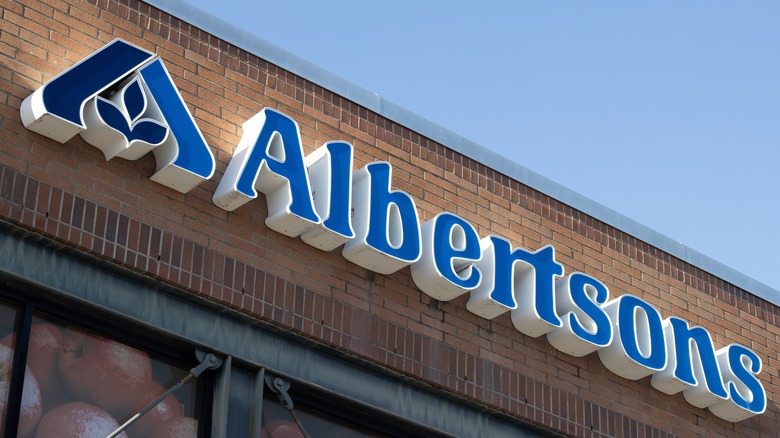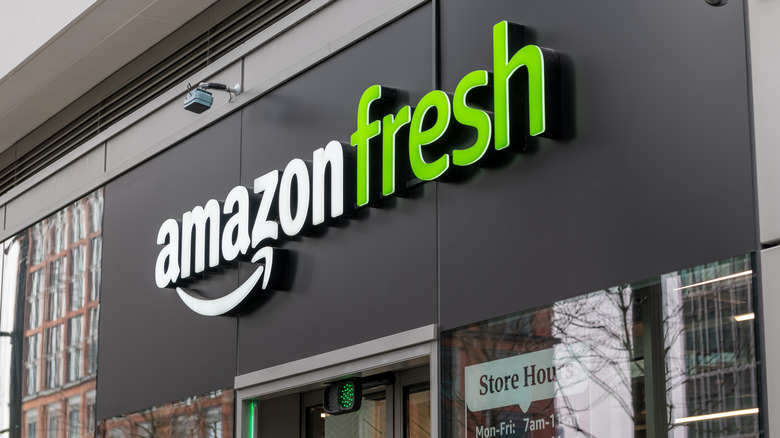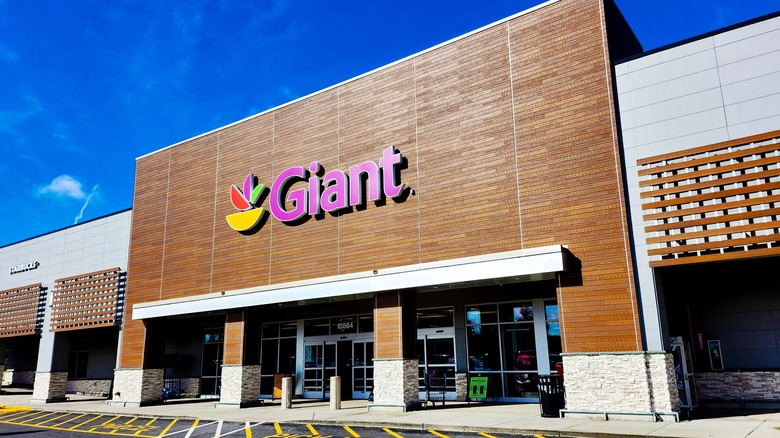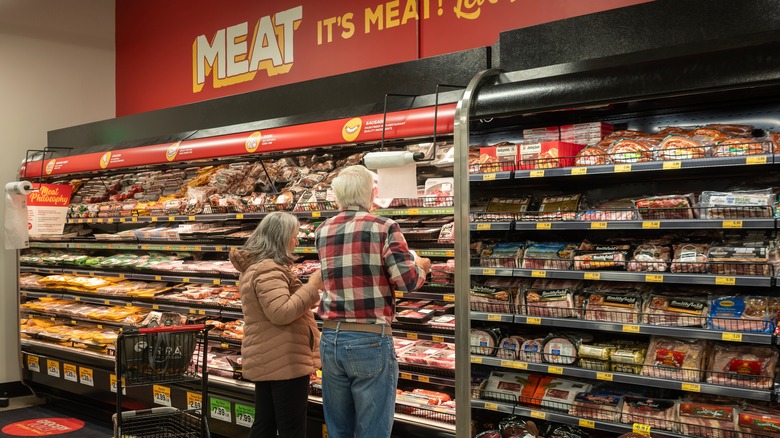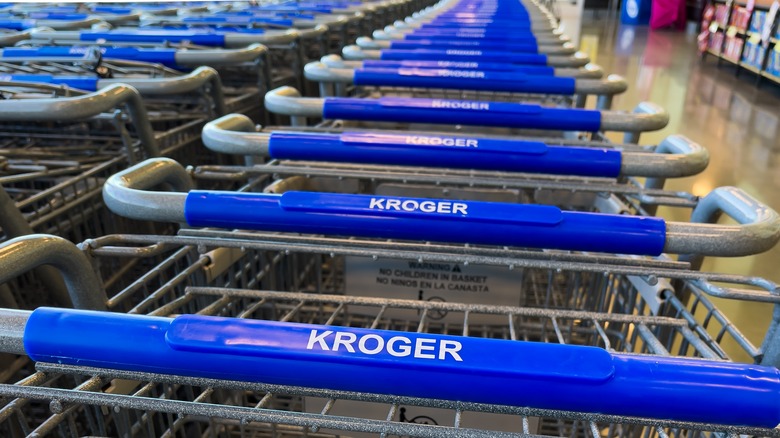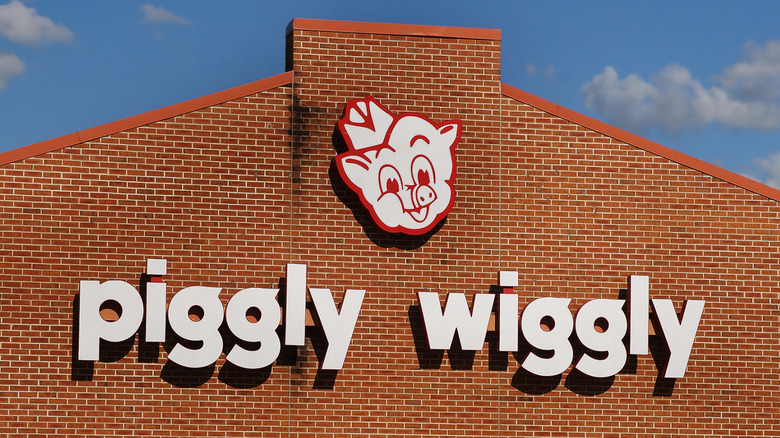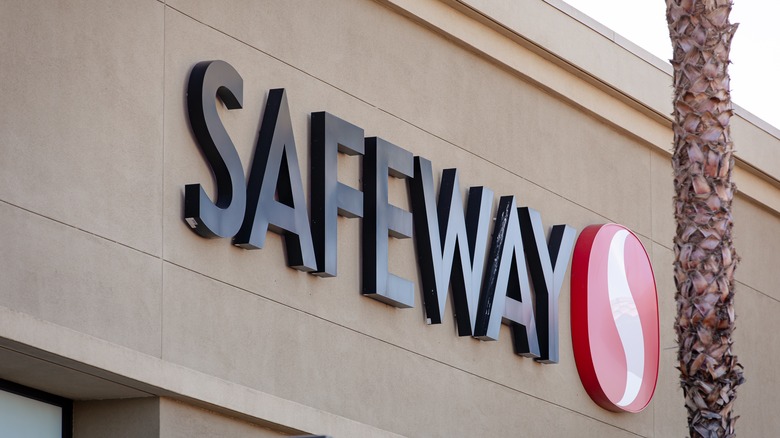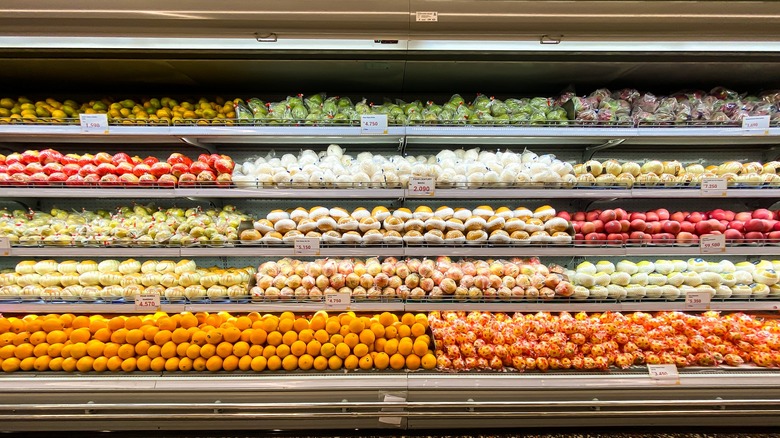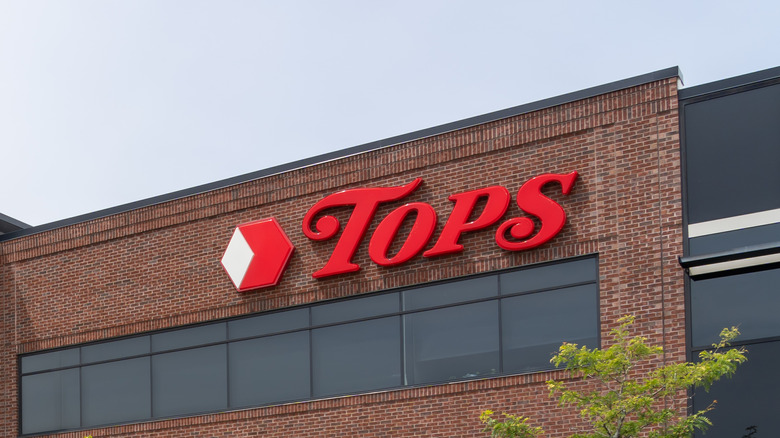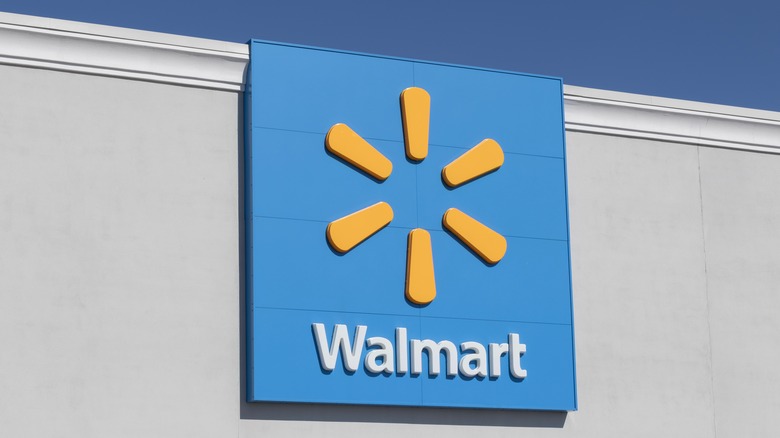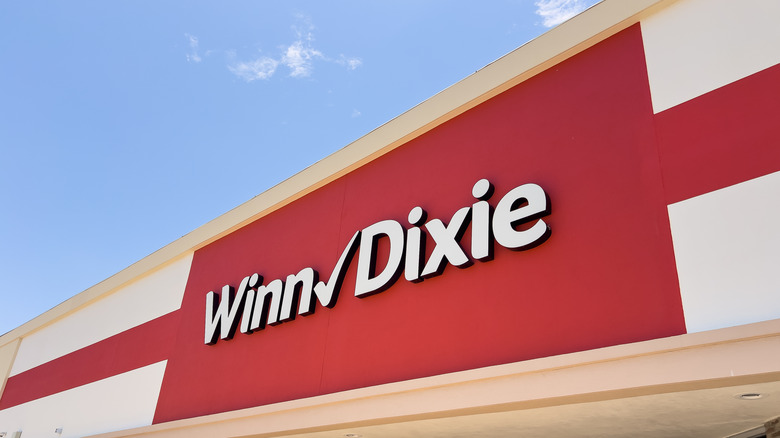These 14 Grocery Store Chains Are Shutting Down Locations In 2025
In the ongoing search for savings, discerning shoppers often rethink popular brand names and instead choose to opt for a generic substitute — or do without. Whether the nearest supermarket was part of a nationwide chain or a local mom and pop, it was easy to overlook the notoriously slim margins that grocery stores operate under to paint them as the villain behind a thinned out shopping cart. That said, the ongoing impact of inflation following supply chain issues during Covid wasn't the only reason that retailers had joined their customers in cinching their belts ever tighter by closing locations.
At the beginning of 2025, the research and advisory firm Coresight Research anticipated that around 15,000 retail locations would close compared to less than 6,000 openings across the country. That figure more than doubled the closings from the previous year. Leadership changes brought on by retirements, ousters, and buyouts were coupled with revamps — successful or otherwise — to explain some of the reasons even well-known chains were asking their customers to shop elsewhere. At the same time, employees were sent packing if they weren't hard to come by as seen in instances were safety concerns were paramount.
Albertsons
Where there had been the promise of growth for the Idaho-based grocery company as 2025 neared, a failed merger at the end of 2024 instead had left Albertsons addressing the likelihood of closures. The planned union with the Ohio-based Kroger had not only fallen apart, but had also devolved into a legal dispute between the companies over who was responsible for the plan going sideways. For Albertsons, this amounted to seeking billions of dollars in restitution to cover legal fees, lost value, and a $600 million termination fee.
On the January 2025 earnings call for 2024's third quarter, Albertsons president and CFO Sharon McCollum made clear that closures would likely occur in the coming years as a result of the "general hygiene of the real estate portfolio." At the time the merger fell through in December 2024, the grocery chain had notified the 87 employees at the Roseburg, Oregon location of its plan to shutter that location in February 2025, making it the first confirmed closure for the brand.
Amazon Fresh
Whether trying out new recipes or aiming for paradigm shifting advancements in society, bold experimentation was often the only way forward — even if that meant a foray into the wild and weird. While being owned by the world's largest e-retailer helped facilitate such efforts, it was no guarantee of success. Roughly a year after Amazon scrapped its "Just Walk Out" technology from its Fresh and Whole Foods Markets, two Fresh locations were marked for closure.
With less than three years of operation for both the Thousand Oaks, California store, scheduled to close in April, and the Manassas, Virginia location, closed in March, Amazon's decision impacted more than 150 employees combined. The Golden State retailer had been among the first to venture into the future of shopping convenience and it would not be the last. In addition to shifting gears from the "Just Walk Out" scheme to smart shopping carts, Amazon had carried on with its plan to open a new Fresh location in Silver Spring, Maryland in March.
Giant
When it came to the decision to close a supermarket in Ashburn, Virginia the reasoning for Giant Food purportedly had to do with over-saturation. Owned by the Netherlands-based Ahold Delhaize, the grocery company had announced the move to shutdown operation in the Shoppes at Ryan Park retail center following 19 years of service for the location. The company asserted that other nearby Giants — on top of pickup and delivery options — were sufficient to handle the needs of customers. At 65,000 square feet, that particular store was the largest Giant in the vicinity, exceeding its closest peer by nearly 10,000 square feet.
In addition to Giant, Ahold maintains ownership of the retail chains Food Lion, Hannaford, and Stop & Shop. The report on the final quarter of 2024 detailed how sales were negatively impacted for their American holdings. On top of faulting a decrease in gasoline sales, the report pointed to the divestment of the online grocery company FreshDirect and the closure of 32 Stop & Shop locations before the end of 2024.
Grocery Outlet
An attempt to course-correct coincided with the abrupt resignation of Grocery Outlet's CEO in late 2024 that set the stage for big changes in 2025. The previous boss had abandoned ship at the California-based discount grocery store as it reevaluated its outlook to finish out the fiscal year, leaving it under an interim head until January 2025. It was then that Jason Potter, formerly of The Fresh Market, took the reigns and set to work on a restructuring plan. Included in the fourth quarter report, the plan addressed the big picture and scrapped costly projects from the agenda.
On top of terminating the leases for unopened stores that were deemed suboptimal, Grocery Outlet nixed warehouse projects as it laid groundwork for fiscal year 2025. Despite the cancelation of 23 leases, the company maintained an outlook that intended to net between 33 and 35 new stores before the year was done. As Potter himself had said, per Grocery Outlet, of the "tremendous growth opportunity" as he sought to reach the chain's "full potential" upon becoming president and CEO, "I understand what it takes to lead and scale this business."
Kroger
Remaining mum on some the specifics with regards to closures, the other side of the failed Albertsons merger hadn't walked away unscathed. Though reasons hadn't been offered on its decision to close Texas locations in May and June respectively, Kroger had announced the ends to its stores in Dickinson and The Woodlands. However, the grocery chain, considered one of the best locations to buy seafood, had been transparent where the January closure of a Nashville, Tennessee store was concerned. In that instance, the Belle Meade Plaza Shopping Center had been acquired by new owners in 2023.
As Kroger offered impacted employees the opportunity to transfer to other stores, it also filed a response to Albertsons amid the competitor's legal action in the wake of the merger fallout. According to Kroger, the other grocery chain had engaged in a "surreptitious campaign" against the merger strategy and had been fleshing out a "Plan B" in the scenario that the merger failed. Under those allegations, Kroger claimed damages from Albertsons and sought recovery of its investment in the merger agreement.
Lunds & Byerlys
Though it sparked concerns of a food desert, Minnesota's upscale supermarket chain named a slew of reasons to shut down its downtown St. Paul locale after more than 10 years in operation. Having grown its operation to nearly 30 locations across the Twin Cities, a 2022 fire was just one of the woes that impacted Lunds & Byerlys ability to do business. Detailed in the announcement on the March closure, the chain had addressed the costly repairs that had delayed reopening following the arson.
Additional criminal behavior like harassment and shoplifting had compounded problems for the market to maintain staff. On top of that, the post-COVID-19 pandemic workforce had amounted to far less foot traffic for the downtown locale, resulting in fewer sales. The expected impact of the closure had officials calling out the void left in losing Lunds & Byerlys. This included City Council Member Rebecca Noecker who vowed to work toward bringing a new grocery store to the area by taking advantage of the established layout left behind, thus ensuring locals would have no trouble purchasing all the ingredients to make their hometown Juicy Lucy cheeseburgers.
Piggly Wiggly
Often overlooked as a result of a constant presence, announced closures of some markets could be at once surprising and bittersweet. After decades in respective communities, Piggly Wiggly shoppers in Alabama and South Carolina had to come to terms with a new normal over the shut down of their own stores from the historic supermarket.
Having relocated from its original spot in Lanett, Alabama customers, had frequented their Cherry Valley Shopping Center Piggly Wiggly since the 1980s until its January 2025 closure. Likewise, some 50 years of operation in Columbia, South Carolina had found locals referring to the market as the "Social Pig." Owner Darrell Miller had informed the community in a March Facebook post that the lease had expired on the store where customers often ran into people they knew. Unfortunately, an agreement could not be reached for a new lease as Miller gave his thanks to shoppers, associates, and the "Pig People" who'd made a career out of serving their community at the Piggly Wiggly.
Royal Blue Grocery
Even before the COVID-19 pandemic hit, crime had stood out as a prominent issue for the small chain of bodegas operating in Texas' capital city of Austin. Following 15 years of serving the downtown area off of the popular Sixth Street, Royal Blue Grocery announced the June closure of what was once its best of seven locations. Co-owner George Scariano estimated the sales slump remained around 60% to 70% of its pre-COVID-19 pandemic levels. At the same time, lessor Annabelle LeBlanc claimed no trouble in finding a new tenant after Royal Blue had sought rent relief.
Having argued to the Austin Business Journal that the area was "thriving," "growing and evolving" in an emailed statement, LeBlanc explained that a concept business from New York planned to operate out of the two-story site. Along with the hit to Royal Blue that offered roughly a dozen employees the chance to work at one of its other locations, Scariano had explained that the Malaysian restaurant Wee Cozy Kitchen, that had partnered with him to operate out of the storefront, had its own uncertain future to contend with as a result of the closure.
Safeway
Downstream of the merger fallout between Albertsons and Kroger, the former's subsidiary Safeway had announced closures of its own for 2025. Running up the Pacific coast from California to Alaska, as well as across the country in Maryland, no fewer than six locations had been slated for shutdown. Near downtown Anchorage, Alaska, the Carrs-Safeway — the oldest Carrs and one of nine in the city — announced a May closure after continued underperformance. Likewise, Oregonians in Baker City had been given a similar timeline for the supermarket with subpar sales.
As a Safeway in Rockville, Maryland had a March closure, some speculated that a planned opening of a Wegmans nearby had influenced the decision. Meanwhile, Californian Safeways in Pinole, San Francisco, and Vallejo added safety concerns to their underperformance as closure dates had been announced throughout the spring. Sales had been a concern for the Vallejo location — one of three — dating back to 2020 when Safeway had filed suit against the development of a nearby Costco arguing there had been a violation of the California Environmental Quality Act. Ultimately, Safeway had settled the dispute and an agreement had been made with the city council.
Shaw's
Elsewhere on the list of Albertsons subsidiaries, the West Bridgewater, Massachusetts-based Shaw's had announced that two of its stores were on the chopping block. Operating throughout the Northeast United States with some 129 stores across Maine, Massachusetts, New Hampshire, Rhode Island, and Vermont, the closures that were announced in March were for markets in the Bay State and Granite State. Specifically, the locations were in Concord, New Hampshire and Gloucester, Massachusetts.
Mush like customer courtesy for one another when observing conveyor belt etiquette, Shaw's had offered to transfer interested employees to its other location in each of the cities. A spokesperson for the company had addressed the "tough decision" to WBZ-TV while leaning toward the positive that the company was "focused on continuing to provide the products and services our customers value most." In addition to the scores of Shaw's stores, the Albertsons brand also owned 21 Star Markets that operated around Boston, Massachusetts. The same region had been where seven of the myriad Stop & Shops that closed in 2024 had been located.
Thom's Market
Sixth Street wasn't the only locale for closing grocers in the city with the motto "Keep Austin Weird." Along with the closure of a Royal Blue Market downtown, all three Thom's Market locations were scheduled to close in April after nearly 20 years serving the Texas capital. While other stores that had opted to close Easter Sunday had done so for the sake of their employees observing the holiday as they saw fit, owner Bill Thom had made clear the brand was riding off into the sunset.
"What started as a simple neighborhood market blossomed into a beloved local landmark," Thom had said in a farewell statement that thanked customers and employees alike. Unlike other closures where a void would be left in the grocer's stead, Thom's had also announced that an agreement had been made with Austin's Select Market to acquire the leases of all three locations, allowing them to reopen under the new banner two days later.
Tops Friendly Markets
Yet another example of cutting off deadweight toward preserving the overall health of the company, employees at the DeWitt, New York Tops Friendly Market were notified about their opportunity to transfer locations before the store's April closure. As one of over 150 locations throughout the Empire State, Pennsylvania, and Vermont, the DeWitt store had become a fixture in the community it served for more than 40 years.
Sentimentality and convenience were not enough to keep the business on life support as obstacles for improvement, including having a school for a neighbor — thus preventing Tops from acquiring more land to expand the store — had proven too costly to overcome. Instead, the chain had announced a $2 million investment at the end of March that would be used toward renovating a former ShopRite location in Ellenville, New York, allowing Tops to get more bang for its buck by opening a new store.
Walmart
Store-level and corporate jobs alike were on the hook for retail giant Walmart that had confirmed no fewer than 11 stores were set to close for good throughout 2025. Of the locations in California, Colorado, Georgia, Maryland, Ohio, and Wisconsin, underperformance had been the key factor in the decision to move on to greener pastures. While the move barely made a dent in the footprint of Walmart that exceeded 4,600 locations across the United States, it did support that the trend of online shopping was not only here to stay for merchandise, but for groceries, as well.
On top of its store closures, Walmart had informed corporate employees in smaller offices, like its Hoboken, New Jersey location, of an option to relocate to either Bentonville, Arkansas — the new headquarters — or Sunnyvale, California. The request had come with Walmarts decision to close its Charlotte, North Carolina office in an attempt to retreat from the remote work similarities of satellites to a more cohesive workforce under a limited number of roofs.
Winn-Dixie
While Kroger and Albertsons may not have been alone dealing with speed bumps toward expansion, Aldi appeared to be having a much smoother time of it. The German multinational company had completed the acquisition of Winn-Dixie and Harvey's as part of some of its big changes in 2024. Rather than merely add the stores to its portfolio, Aldi had begun a conversion effort and set about closing locations under the previous brands before reopening under its own banner.
Along with a location in Leesburg, Virginia, stores in Boca Raton, Fort Lauderdale, and Sebastian were just a few of the Florida Winn-Dixies that set about closing down while many other Sunshine State locations underwent the process of auctioning off equipment to better facilitate the conversion plan. However, not all closures were part of that process as four locations in Alabama were slated for closure in spring with no plan to reopen. Meanwhile, as Aldi set its sights on 2027 to complete the process, it had agreed to release 170 stores into the possession of Southeastern Grocers after private investors had completed their own acquisition in February.


